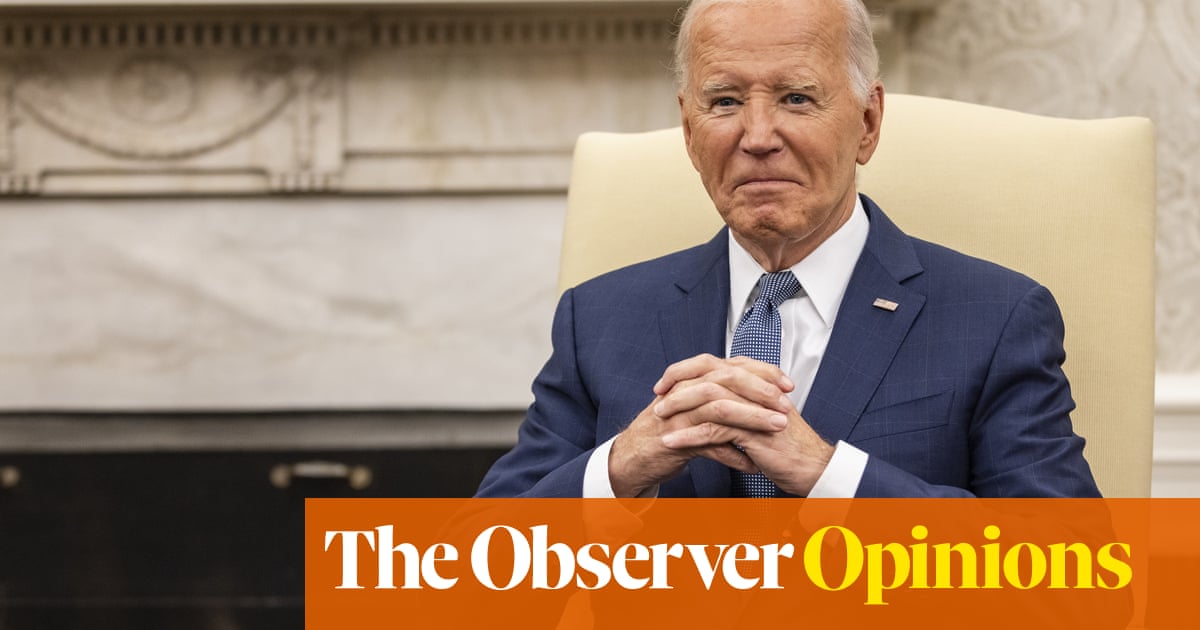Imagine an old man sitting by himself in a dingy all-night diner in downtown Washington. He has his back to the window, shoulders hunched, like the customer in Nighthawks, Edward Hopper’s famous painting. Joe – for the old man’s name is Joe – looks tired and mournful. Perhaps he’s thinking about what was, about what might have been. For him, it’s a nightmare.
Yet even if this really were the president, and even if the disgraced Secret Service allowed him so fanciful a private moment, Joe need not feel sad or alone. He has six months left in charge. On paper, he’s still the world’s most powerful man. And he no longer has to worry about re-election, votes, polls or TV debates. Who cares now what pundits say?
Joe is free in ways he never has been since he first entered public life more than 50 years ago. Screw the Republicans. Screw Congress. Up to a point, he can do what he likes. Rather than fade into the shadows, mocked as a lame duck, Biden could yet have the final say, enjoy the last laugh, take it to the limit. Last Tango in Washington meets Last of the Summer Wine.
In November 1992, after losing to Bill Clinton, George HW Bush found himself in a similar position, although he had only two months left in office. Like Biden, Bush was a foreign policy nerd, and the president, not Congress, directs foreign policy. So, because he thought it was the right thing to do – but basically because he could – Bush, to widespread amazement, invaded Somalia.
Truth be told, it wasn’t a big success. America’s military intervention in support of UN famine relief and nation-building fuelled the Somali civil war. It led to the battle of Mogadishu and the greatest US military humiliation since Vietnam. It saddled Clinton with a huge problem. Yet Bush had made his point. Prematurely write off a president at your peril.
Depleted though he appeared in last week’s trance-like Oval Office appearance, Biden still has time and leverage to frame America’s future and, to some degree, the world’s. Unexpected crises will arise, demanding action. Policy decisions could force his successor’s hand, be it Kamala Harris or Donald Trump, and change the course of history. It’s a honeymoon in reverse.
Will Biden seize the chance to further imprint and expand his legacy? In his TV address, he promised to press on with his domestic agenda: a stronger economy, lower living costs, civil rights. He stressed “saving our democracy” from the Trump menace. “The idea of America lies in your hands,” he said. “We just have to keep faith… and remember who we are.”
Yet last week’s visit by Benjamin Netanyahu, Israel’s prime minister and war crimes suspect, was a forceful reminder that Biden has unfinished business in the Middle East. The visit came amid ongoing slaughter of Palestinian civilians in Gaza and followed the World Court’s landmark ruling that Israel’s occupation and expropriation of Palestinian land are illegal and must end.
Will a belatedly emancipated Biden make amends for earlier mistakes? Significantly, Harris felt free to take a tougher line in her talks with Netanyahu. US recognition of a Palestinian state, which she hypothetically supports, if coupled with a pause in offensive weapons supplies to Israel, could change the entire Mideast dynamic.
Netanyahu’s demagogic speech to Congress cast the conflict with Hamas as part of wider proxy war with Iran, America’s “most radical and murderous enemy”. This was a typical bluster. Netanyahu has conveniently forgotten that Biden, when first elected, wanted to do a deal with Iran.
A more amenable president is taking office in Tehran this month. Biden, if he wished, could try again to revive the diplomatic pathway demolished by Trump. Saudi Arabia and Iran have already taken tentative steps. A Gaza ceasefire, a Saudi-Israel compact and a Palestine-Israel two-state process are the glittering prizes.
Biden has a last chance, too, to correct another glaring error – his failure to effectively confront Russia directly over its invasion of Ukraine. Vladimir Putin is impatient for Trump’s return. He expects his fellow bullyboy to dump Ukraine and gift him a de facto victory.
That would be a disaster. Harris would surely support tougher action on Russia if Biden shows a lead. In the first instance, he should warn Putin that air, drone and missile attacks on civilian targets far beyond the frontlines must cease immediately – and, if not, will be repulsed by defensively deployed US and Nato air and sea forces. It’s never too late to draw a red line.
after newsletter promotion
Biden’s legacy as a champion of democracy and the international rules-based order would be immensely fortified were he to initiate UN security council reform, speak up for universal human rights and revive global nuclear counter-proliferation efforts while he still can. Biden should and explicitly guarantee Taiwan’s defence.
Six months is not long to change the world. Doubly fortunate is he who gets a second chance. Some valedictory Biden political home-runs could help reduce the mountain of challenges, domestic and foreign, awaiting a President Harris. They could help stymie a returning Trump.
Most importantly, perhaps, in dangerous, divided times, Biden can still set the tone. “Do we still believe in honesty, decency, respect, freedom, justice and democracy?” he asked as he launched his long goodbye. “Does character in public life still matter?” The answer is a resounding “yes” – but amid the clamour of the advancing electoral storm, it requires repeating at regular intervals by a figure who commands respect.
Message to twilight Joe, brooding in the diner over his cold cup of coffee: it’s not quite over yet. America still needs you.
Simon Tisdall is the Observer’s foreign affairs commentator







